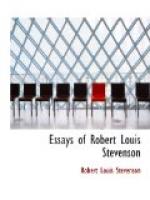sore against the traditions of his life. You
can imagine how he would fare in a novel by Miss Mather;[35]
yet this rag of a Chelsea[36] veteran lived to his
last year in the plenitude of all that is best in man,
brimming with human kindness, and staunch as a Roman
soldier under his manifold infirmities. You could
not say that he had lost his memory, for he would
repeat Shakespeare and Webster and Jeremy Taylor and
Burke[37] by the page together; but the parchment was
filled up, there was no room for fresh inscriptions,
and he was capable of repeating the same anecdote
on many successive visits. His voice survived
in its full power, and he took a pride in using it.
On his last voyage as Commissioner of Lighthouses,
he hailed a ship at sea and made himself clearly audible
without a speaking trumpet, ruffing the while with
a proper vanity in his achievement. He had a
habit of eking out his words with interrogative hems,
which was puzzling and a little wearisome, suited
ill with his appearance, and seemed a survival from
some former stage of bodily portliness. Of yore,
when he was a great pedestrian and no enemy to good
claret, he may have pointed with these minute guns
his allocutions to the bench. His humour was perfectly
equable, set beyond the reach of fate; gout, rheumatism,
stone and gravel might have combined their forces
against that frail tabernacle, but when I came round
on Sunday evening, he would lay aside Jeremy Taylor’s
Life of Christ and greet me with the same open
brow, the same kind formality of manner. His
opinions and sympathies dated the man almost to a
decade. He had begun life, under his mother’s
influence, as an admirer of Junius,[38] but on maturer
knowledge had transferred his admiration to Burke.
He cautioned me, with entire gravity, to be punctilious
in writing English; never to forget that I was a Scotchman,
that English was a foreign tongue, and that if I attempted
the colloquial, I should certainly be shamed:
the remark was apposite, I suppose, in the days of
David Hume.[39] Scott was too new for him; he had
known the author—known him, too, for a Tory;
and to the genuine classic a contemporary is always
something of a trouble. He had the old, serious
love of the play; had even, as he was proud to tell,
played a certain part in the history of Shakespearian
revivals, for he had successfully pressed on Murray,
of the old Edinburgh Theatre, the idea of producing
Shakespeare’s fairy pieces with great scenic
display.[40] A moderate in religion, he was much struck
in the last years of his life by a conversation with
two young lads, revivalists. “H’m,”
he would say—“new to me. I have
had—h’m—no such experience.”
It struck him, not with pain, rather with a solemn
philosophic interest, that he, a Christian as he hoped,
and a Christian of so old a standing, should hear
these young fellows talking of his own subject, his
own weapons that he had fought the battle of life
with,—“and—h’m—not
understand.” In this wise and grateful




